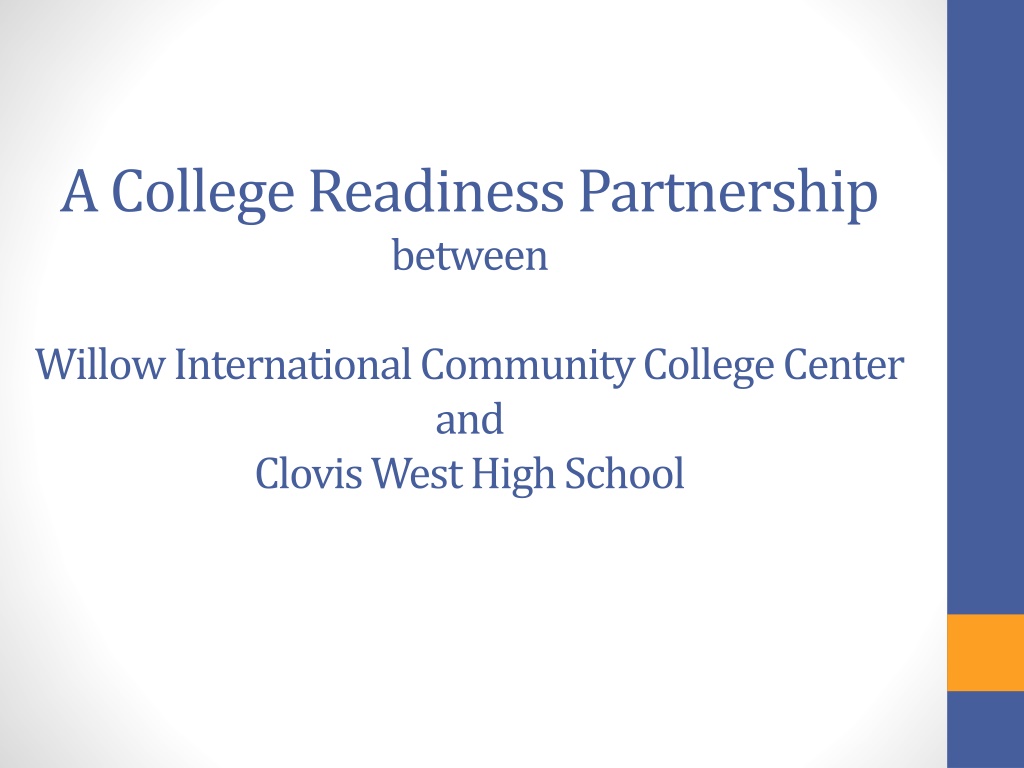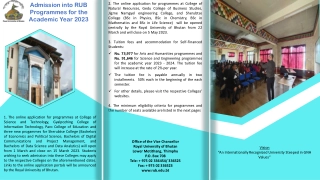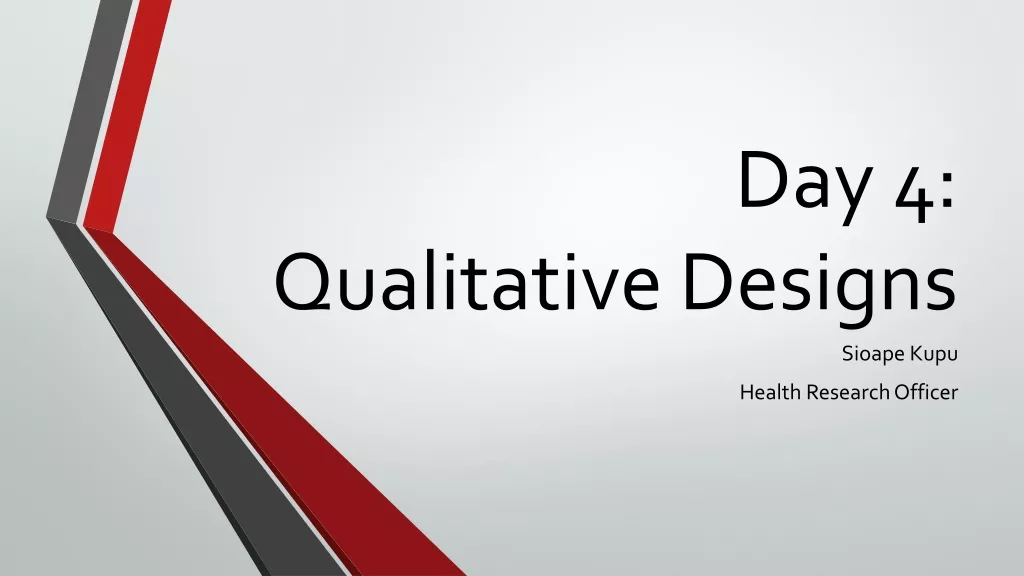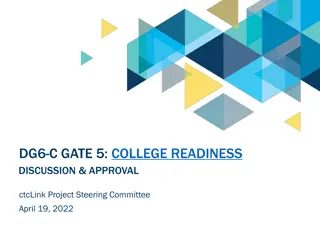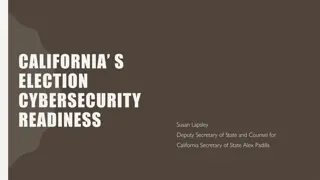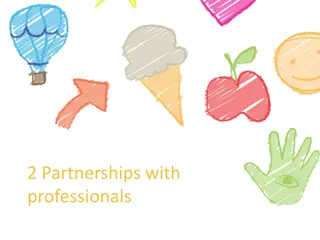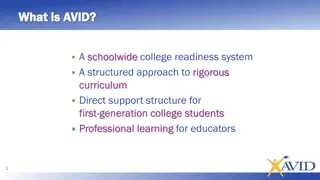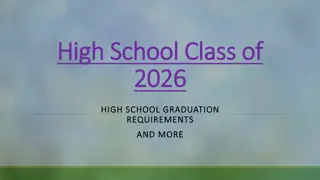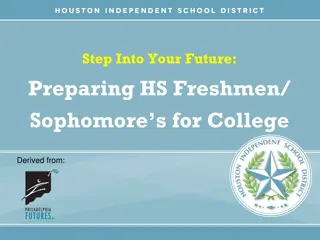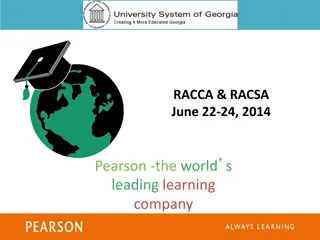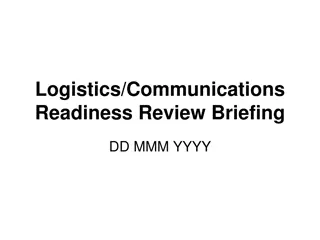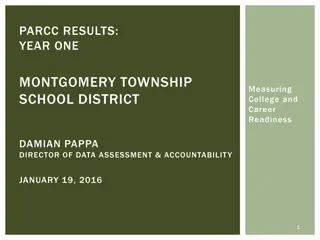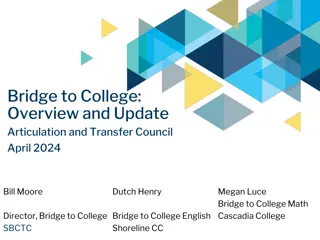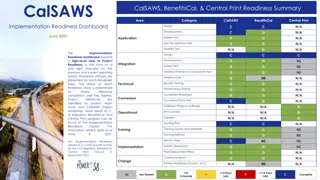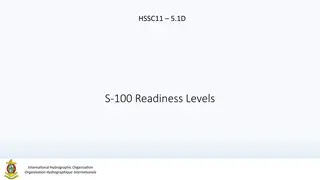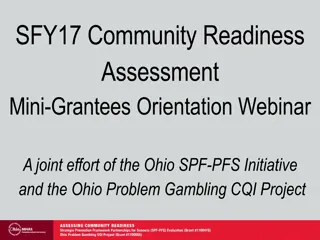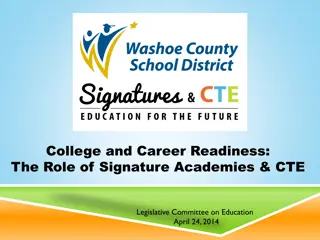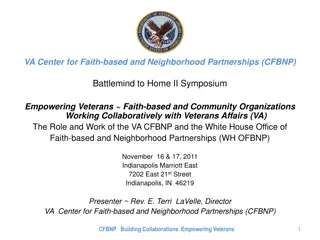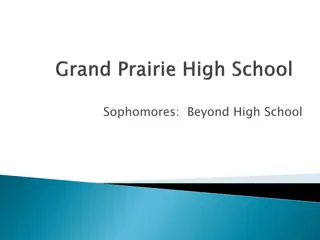Enhancing College Readiness Through Partnerships
A collaboration between Willow International Community College and Clovis West High School has led to improved college readiness, with a focus on aligning curriculum to reduce the need for remediation. This partnership has resulted in increased college freshman English placement, higher attendance rates, and enhanced minority representation among college-bound graduates. Addressing the disconnect between high school and college academic expectations has proven beneficial for all stakeholders involved.
Download Presentation

Please find below an Image/Link to download the presentation.
The content on the website is provided AS IS for your information and personal use only. It may not be sold, licensed, or shared on other websites without obtaining consent from the author.If you encounter any issues during the download, it is possible that the publisher has removed the file from their server.
You are allowed to download the files provided on this website for personal or commercial use, subject to the condition that they are used lawfully. All files are the property of their respective owners.
The content on the website is provided AS IS for your information and personal use only. It may not be sold, licensed, or shared on other websites without obtaining consent from the author.
E N D
Presentation Transcript
A College Readiness Partnership between Willow International Community College Center and Clovis West High School
Abstract A partnership between English administration and faculty from Willow International and Clovis West High School has resulted in a significant increase of students who place directly in college-level English and thus, do not require remediation. Actions have included curriculum alignment between college mandated student learning outcomes and high school mandated standards which focused on academic behaviors as well as academic performance. Significant results include increased college freshman English placement, increased college attendance, and increased minority representation among college-going graduates.
The Problem from the Point of View of All Stakeholders Too many college/university instructors complain that their students aren t prepared well enough to succeed in post-secondary classes Too many high school teachers insist they are teaching exactly what they should be teaching and should not have to change class content Too many parents are confused and angry that their student is failing in college/university Too many students struggle in post-secondary classes and accuse the educational system of being unfair
College/University Instructors Students expect that instructors will explain assigned texts, accept late work, allow revisions, and give extra credit/second chances There is a disconnect between secondary and post-secondary academic behaviors as well as academic skills Students are not prepared for college/university-level reading and writing (Borden, et. al., 2006; Conklin & Sanford, 2007; Conley, 2007; Kirst & Venezia, 2004; Martinez & Klopott, 2005; Tell & Cohen, 2007)
High School Teachers English teachers at high schools with API scores that are relatively high see no reason to change curriculum content College instructors need to focus on teaching their students and not on what high school instructors teach their students Most high school English instructors feel that literary analysis is the appropriate focus for course offerings based on California standards (Conley, 2007; Conklin & Sanford, 2007; Tell & Cohen, 2007)
Parents Some parents contact college/university staff to discuss their child s lack of progress but faculty and staff are legally unable to discuss student performance with parents Parents and the community rightly expect that educational professionals grow and change by keeping current with sound educational research Some parents contact high school administration and counselors to discuss why their child is not succeeding in college/university (Darlaston-Jones, et. al., 2003; Larose & Boivin, 1998)
Students Too many students do not understand the culture and structure of postsecondary education and the intellectual norms that must prevail in this environment Too many students are unable to take away the key intellectual lessons a college/university course was designed to convey and develop The situation is unfair; too many students are failing their college/university classes (Conley, 2007; Kirst & Venezia, 2004)
CW Graduates Needing Remedial English School Year UC CSU SCCCD 2005-2006 NA 45% 70% 2006-2007 NA 47% 75% 2007-2008 NA 47% 74% 2008-2009 NA 53% 79% 2009-2010 NA 45% 67% (CW Counseling Office, 2010)
Comparison of English Remediation Remediation Rates Freshman English Remedial English 29% 43% 45% 65% 67% 83% 71% 57% 55% 35% 33% 17% National 4 year National 2 year CSUF All HS CSU CWHS WI WI All HS CWHS (California Department of Education , 2010; CW Counseling Office, 2010; WI Counseling Office, 2010; )
Secondary-Led Focus Questions Leading Questions: What should our students be able to do when they leave high school? Sub-Questions: Why are good high schools with good teachers producing so many graduates who struggle with post-secondary reading and writing? Is the high school English curriculum preparing our students to be college and career ready?
CW Demographics: 2010-2011 Percentage of minorities in senior course offerings Senior class percentages by ethnicity 63 48 50 49 38 29 29 14 6 3
Current Course Offerings English 9 Honors 9 Grade 9 English 10 Honors 10 Grade 10 American Literature and Composition AP Language and Composition Grade 11 World Literature and Composition AP Literature and Composition Grade 12
English 1A Statistics Chart Title Pass 1A Fail 1A 70 67 33 30 All WI Students CWHS Students at WI
Post-Secondary Teacher Survey Hard Skills (Academic) Reading Deficiency Nonfiction comprehension Documenting Sources Writing Deficiency Topic Narrowing Organizing Support Formatting Critical Thinking Deficiency Appropriate Sources Synthesizing Sources Soft Skills (Behavior) Attendance Personal Responsibility Preparation Participation Time Management Study Skills Tenacity Strategies Professional Interactions SCCCD English Department, 2010
Too Many Student Require Remediation CWHS Observations Post-secondary course outcomes versus state standards College Non-fiction versus High School fiction curriculum Number, type, length of assigned and assessed texts Mastery versus Second Chance behaviors Professional Development for secondary teachers of English SCCCD Observations Weak English Conventions Skills overall An inability to read non- fiction texts A habit of personal expression and personal narratives The expectation of second chances, extra credit, and leeway on due dates An inability to manage time for assignments
Exit Points 43% will successfully complete the course 60% of those students will have success in 125 If 30 students begin the class, 8 will succeed in 125 WI 252 52% will successfully complete the course 68% of those students will have success in 1A If 30 students begin the class, 10 will succeed in 1A WI 125 58% of high school students who initially place into freshman English actually complete a college degree 64% of students who pass ELA AP exams complete a college degree having placed into freshman or sophomore English Nationally Dougherty, Mellor, & Jian, 2006; Schneiders, 2010; WI Counseling Office, 2010)
Standards and Outcomes respond to literature by identifying significant ideas, analyzing imagery, diction, and theme, supporting ideas and viewpoints through accurate and detailed textual references, demonstrating an appreciation of the effects caused by an author s stylistic devices, and assessing the impact of perceived textual ambiguities, nuances and complexities 11/12 CA State Standards produce expository, analytical, and argumentative compositions that introduce a complex central idea and develop it with appropriate evidence drawn from primary and/or secondary sources, cogent explanations, and clear transitions; English 125 Outcomes 11/12 Common Core Standards Write informative/explanatory texts to examine and convey complex ideas, concepts, and information clearly; write arguments to support claims in an analysis of substantive topics or texts; Gather relevant information from multiple authoritative print and digital sources using advanced searches effectively
Institutional Practices Student post-secondary readiness Student academic performance Student academic behaviors Collaboration between secondary and post- secondary institutions Common Goals Formative Assessment Focus vs. Summative Assessment Focus Concurrent Remediation vs. Prerequisite Remediation Teacher-Student-Parent Relationships vs. Teacher-Student Relationships Divergent Practices
Many students Want an easy senior year Don t understand what it really means to be college-ready Don t understand what the post-secondary system requires Don t understand that college is a reasonable and realistic goal Don t understand that their journey towards college begins before high school There s a strong correlation between elementary school English and middle school English success There s a strong correlation between middle school English and high school English and math success (Dougherty, Mellor & Jian, 2006,;Larose & Boivin, 1998; Tell & Cohen, 2007)
Key Academic Behaviors Self-awareness Positive class contributions Understand what does and doesn t work Self-monitoring Ability to identify and select appropriate strategies Content mastery Self-control Time management Persistence to complete complex tasks (Conley, 2007; Kirst & Venezia, 2004; Tell & Cohen, 2007)
Implications for Change Secondary Schools need to ask: How many students need English remediation in college? How many students take AP/concurrent college classes? How many students have appropriate academic behaviors? Post-Secondary Schools need to ask: Are students successfully completing freshman English? Do students choose stimulating? Can students navigate through registration systems, research mediums, and add value to their educational community?
Establishing a Partnership Administration Support Public Relations Curriculum Revision Addressing Resistance CCS + Behaviors Creating and Maintaining Rigor All students can learn; all students deserve the opportunity to be college-ready
Reverse Engineering Content Assignments Assessments Behaviors Content Assignments Assessments Behaviors
Common Policies Grading Policy Make-up Policy Mastery Policy Persistence Online Dialogue Revision Time Management Weekly Agenda Due Date Calendar Academic Behaviors
Units based on Rhetorical Strategies Initial Instruction Themed Model Texts Guided Practice Culminating Essays and Presentations Supplementary Activities Mastery and Intervention
Building Global Awareness vs Literary Canon Community Poverty Health Technology Consumerism Education Crime War Environment Gender Race and Ethnicity Philosophies Age Economics Politics
Guided Practice Graphic Organizers Socratic Seminar Philosophical Chairs Pre-Writing Outlines Background Activity Thesis Pre-Reading State and Support Support Reading Summarize Syllogisms Question Generation Fallacies Rebuttal and Support Discussion Structure and Style Reflection Evaluation Conclusion
Supplementary Activities College and Career Technology Grammar Vocabulary Research Tool Bar Revision Editing Academic Content Application Navigation
Placement Test Date 250/260 (Grade 11) 125/126 (grade 12) 1A % 1A (College Eng) ESLC (College Eng) August 2011 (237) 6 75 86 70 29.5 Piloting the New Curriculum Initial Benchmark Data for Non-AP 1A Placement Clovis West (2011 2012)
I was looking forward to an easy senior year. Clovis West is a great school. Why take a chance to make it worse? You should have started in 9th grade so seniors would be used to the work you have planned. Push me push me hard. I need to go to college. What ever that takes to get me there I am willing to do. Initial Student Comments Concerning Curriculum Changes
250/260 (Grade 11) 125/126 (grade 12) 1A % 1A (College Eng) Placement Test Date ESLC (College Eng) August 2011 (237) 6 75 86 70 29.5 December 2011 (229) 42.35% 1 54 77 97 Piloting the New Curriculum Second Benchmark Data for Non-AP 1A Placement Clovis West (2011 2012)
235/237 Respondents Agree Disagree 80.8% (189) 88.8% (208) 87.6% (205) 92.7% (217) 29.2% (46) 11.2% (25) 12.4% (30) 7.3% (18) I am a better reader than when school started this year. I am a better thinker than when school started this year. I am a better writer than when school started this year. I feel more prepared to succeed in college next year. Mid-year Student Survey: Student Self-Efficacy
235/237 Respondents Agree Disagree The type of reading assignments in this class are appropriate for my grade level. 96.1% (226) 90.6% (213) 96.1% (226) 87.2% (205) 3.9% (9) 9.4% (22) 3.9% (9) 12.8% (30) The number of reading assignments in this class are appropriate for my grade level. The type of essay assignments in this class are appropriate for my grade level. The number of essay assignments in this class is appropriate for my grade level. Mid-Year Student Survey: Workload Quality and Quantity
Without this class which gives me three more chances I would be in the lowest English class they had to offer and would be way behind going into college I believe that this class can help prepare high school students to transition to college. The earlier that this type of teaching and learning is started, the better it will show in the results. Teachers need to take their job more seriously and not give their students an easy grade. My 9-11 grade English classes didn t teach me anything I feel; I wish I had better English classes my freshman through junior year. Coming into this class I can say I wrote like 4 papers all together and now I have to write 12. That is more than all the papers combined that [I ve wrote] my whole high school career AND I was not prepared :( Mid-Year Student Comments Concerning Curriculum Changes
African- American Asian- American European- American Hispanic- American Minority Totals 1A Number 1 4 13 12 17 Class 3% 13.3% 43.3% 40.0% 56.6% Percentage Site 6% 14% 49% 26% 51% Percentage 1A Demographics (30)
Placement Test Date 250/260 (Grade 11) 125/126 (grade 12) 1A % 1A ESLC (College Eng) (College Eng) August 2011 (237) 6 75 86 70 29.5 December 2011 (229) 1 54 77 97 42.35 March 2012 (237) 0 25 82 130 54.85 May 2012 (237) 58.22 0 19 80 138 Final Results of Year 1 (2011 2012)
Where are we now? - Breaking news: as of yesterday literally we have 57% of the non-AP students ready for English 1A, and 128 students are enrolled in 1A for the Spring semester. Most of the rest of them have tested at a level that we expect will bring them to 1A readiness for Fall. Last year s figures include this interesting fact. Since we began this program, we have raised college-bound seniors to 84% of the total graduating class. It is also worth remembering that Clovis West is a minority school (53%) and economically disadvantaged with 34% on lunch programs.
Exemplary people get exemplary awards It hasn t been widely broadcast, but this program was awarded an honorable mention by the State Academic Senate s Exemplary Award committee. In addition, Ellen Melocik, chair of the English department at CW, Karen Hammer, learning director at CW, and I will be presenting at the Community College League s Innovations conference in March. We rock, he said modestly.
SCCCD 1A Placement Clovis North Buchanan Clovis East Clovis High Clovis West 2010 31% 18% 18% X 26% 2012 28% 16% 14% 17% 40% Percentage of students enrolled in a four year college CUSD High Schools Clovis West Buchanan Clovis East Clovis High Clovis North 2012 42% 33% 29% 43% 44% Comparative Results
I cant believe I got an A on my first essay one of the highest in the class! And your class also prepared me for reading and writing in my other classes [Military Academy] I can tell you with all the writing we did last year, the writings here are a piece of cake. [4-year institution] I knew exactly what to do for the first essay, and my teacher thought so too! And I didn t wait until the night before to write it! [2-year institution] Just wanted to send a little thank you and say that surprisingly the readings that I read in high school, and that I never expected to help me, are actually giving me a slight advantage over my new classmates. [4-year institution] Recent Student Feedback
Connect with a partner high school Designate leaders from both campuses Administration must be on board Financial Support Policy Change Support Time Support At least some staff must be willing and brave; leaving egos behind Early parent/community communication Open Forums Newsletters Consistent Rigor for assignments and assessments Norming Calibration Data-Driven Analysis for Planning and Revision How does this work for your institution?
Every student can learn Every student deserves the opportunity to learn Questions or Comments
